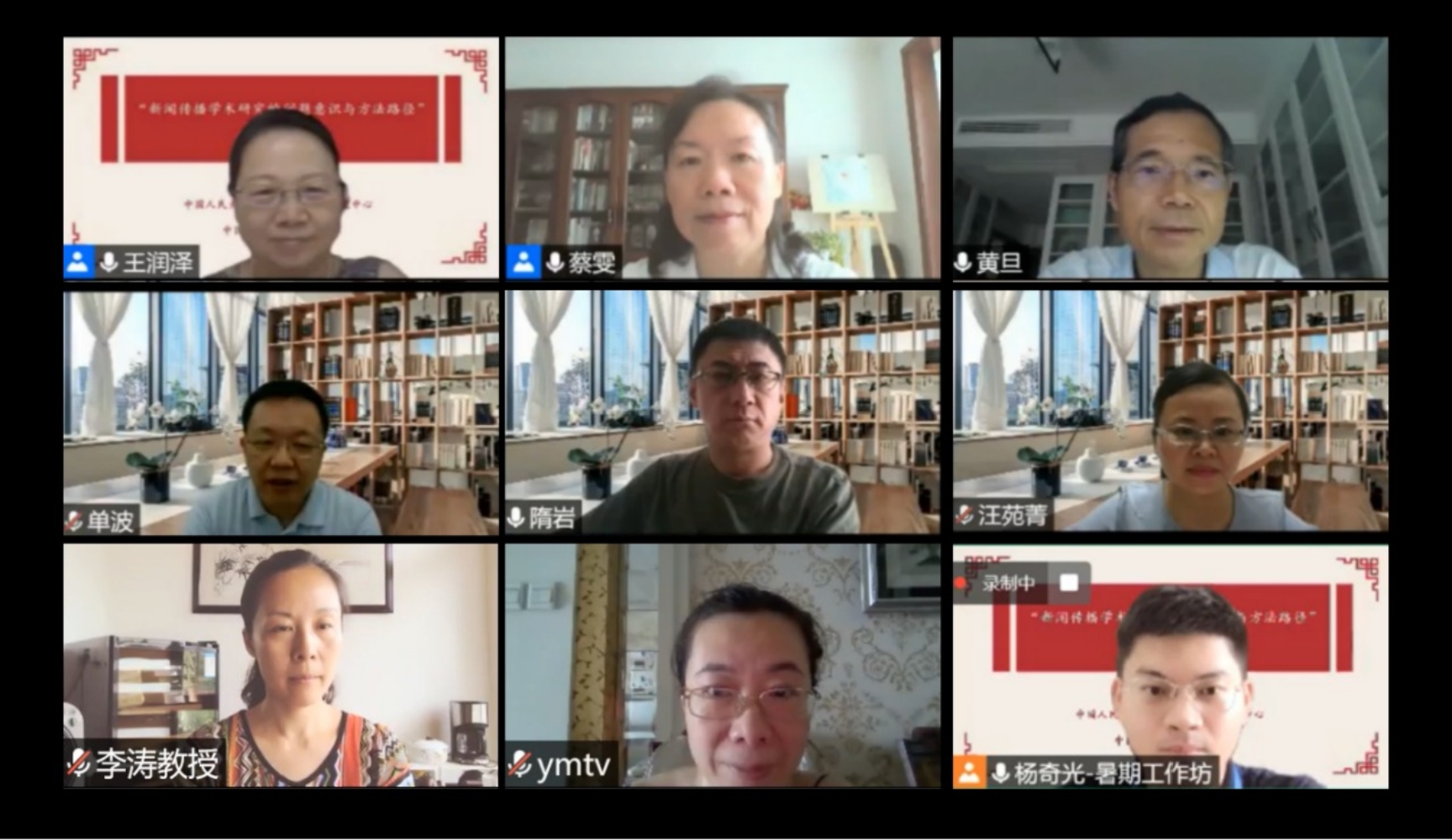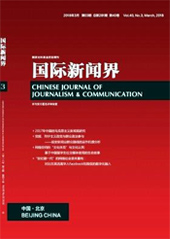Events
Academic Conference: The problem consciousness and method path of journalism and communication research
Author: Time:2020-12-24
On August 29, the Research Center of Journalism and Social Development of RUC, the school of journalism of RUC and CAHJC (the Chinese Association for History of Journalism and Mass Communication) jointly held an online summer workshop. With the theme of " The problem consciousness and method path of journalism and communication research", this workshop focused on how to establish a conscious problem awareness, how to make the research of catching up with hot spots turn into truly meaningful academic achievements. A hundred experts, scholars and teachers from journalism colleges and universities gathered online for discussion.

Address
The summer workshop was presided over by Professor Wang Runze, vice president of School of journalism, president of CAHJC, executive director of the Research Center of Journalism and Social Development of RUC. Professor Cai Wen, director of the Research Center of Journalism and Social Development of RUC, delivered a speech.
On behalf of the Research Center of Journalism and Social Development of RUC, professor Cai Wen welcomed all the experts and students. She said that it was the first time that the workshop on "The problem consciousness and method path of journalism and communication research" was held in the form of online conference through the Internet. The current crisis facing all mankind needs more communication and understanding. Journalism and communication has become a "prominent learning" that more and more people are concerned about and interested in. The theoretical innovation of this subject is the expectation of the country, and also the goal that researchers are yearning for and may achieve.
Special lecture: Problem consciousness of journalism and communication
Huang Dan, a senior professor of Arts at Zhejiang University, believes that learning is not a skill. At present, there are three problems in the academic circle: 1. No problem; 2. No new problem; 3. No value. To solve these problems, first of all, we should read a lot, find out the problem, change the way of asking questions, and keep asking questions. Second, don't talk about relationships unless necessary. Finally, the significance of solving the problem must fall on the particularity of the problem. Instead of taking the problem as a case, we should verify a general conclusion.
Yang Baojun, a professor at the school of Journalism at RUC, said that the problem stems from research. First, the truth of learning is very simple, the truth of finding problems is also very simple, speaking out is common sense. Second, problems come from research. The more research we do, the more problems we have, and the more likely we are to find valuable problems. Third, research is to find problems, methods, and answers. The purpose of learning is to create our own ideas. As for other sources of problems, Professor Yang Baojun pointed out that problems come from reading, observation, thinking, communication and writing. Researchers should read more, think more and find their own core and stable interests.
Professor Wang Runze summarized Professor Huang Dan's and Professor Yang Baojun's lectures, and pointed out that they have a common direction, that is, learning is not a skill, but a life, a realm and a pursuit. Both professors emphasize reading. Many of the western classical theories we read are aimed at a certain problem in western society. If we have a clear understanding of the background of the emergence of classics, we can understand its direction more clearly.
Professor Shan Bo, director of the Media Development Research Center of Wuhan University, took "Cross cultural communication in the interdisciplinary perspective" as the theme of his speech. He pointed out that cross-cultural communication comes from globalization and faces the challenge of globalization. With social mobility, people adapt to culture in order to survive, which leads to the question of "how is cross-cultural communication possible". Different subjects ask questions in a specific context, forming a framework of questions among subjects, groups, languages and cultures, and forming a pluralistic question consciousness.
Professor Sui Yan, dean of the school of journalism of CUC and director of the National Communication Innovation Research Center of CUC, talked about four understandings about the problem consciousness of research: 1. The problem consciousness should not stop at the surface of summary problems, but should look for the academic rationality and regularity behind the problems. 2. If the new problem is not well written, it is not a good article. The iron tree has new flowers, but the old problem can write new ideas. 3. Similar problems can be done again, but with different perspectives, for example, the perspective of other disciplines can be introduced or grafted with other disciplines; 4. Common sense problems often reflect the essence of life, academic research can not only pursue fashion and ignore common sense and essence.
Professor Cai Wen, director of the Research Center of Journalism and Social Development of RUC, said that journalism research is highly applied, and we should pay attention to finding problems in journalism and media practice. When determining the specific topic, we should consider the feasibility more comprehensively, such as whether the researchers have mastered the scientific and effective research methods, whether they can get the support of external conditions, such as contacting the relevant media and professionals, contacting the most important parties, obtaining the required data, etc. The knowledge structure, work experience and time guarantee of researchers are also important factors.
Sub Forum: Discussing the problem consciousness of journalism and communication
In the afternoon, the three sub forums were held in turn, and teachers and students from many journalism colleges and universities had deep academic exchanges, creating an academic dialogue space for the participants to discuss, build and share.
Sub Forum 1: Knowledge map of journalism and communication research
The theme of sub Forum 1 is the knowledge map of journalism and communication research. The speakers are: Zhou Maojun, Professor of School of Journalism and communication, Wuhan University; Di Ming, PhD student of School of Journalism and communication, Wuhan University; Wang Fangfei, lecturer of Humanities and Social Sciences, Dalian University of Technology; Jiang Mengmeng, master of journalism, Dalian University of Technology; Liu Ranran and Wang Ruilu, PhD students of School of journalism, Renmin University of China.
The sub forum was hosted by Professor Deng Shaogen, School of journalism of RUC. The reviewer was Professor Zhang Yuqiang, Communication University of China.
In conclusion, Professor Zhang Yuqiang said that we will only study issues of academic value and significance. Taking the cooperation among research scholars as an example, we should pay attention to the state of cooperation among scholars, why we are in such a state of cooperation, whether the forms of cooperation in this field are different and unique compared with other fields, and why this situation occurs. We can also further ask about the purpose of cooperative research. These thoughts need a lot of literature support. Only by refining it into conceptual questions can we contribute to the academic research.
Sub forum 2: Problem consciousness of journalism and communication research
The theme of sub forum 2 is the problem awareness of journalism and communication research. The speakers are: Gao Haitao, associate professor of Beijing University of Printing; Du Kaijian, postdoctoral fellow of School of journalism of RUC; Wang Yuanjing, lecturer of School of Journalism and communication of Guangxi University; Han Xiu, lecturer of network new media major, School of Culture and Communication, China Women's University.
The sub forum was presided over by Professor Chang Jiang, School of communication, Shenzhen University. The reviewer was Professor Zhu Chunyang of School of journalism, Fudan University.
Professor Zhu Chunyang commented on the four articles one by one, and pointed out the problems existing in each article on the basis of affirmation. He believes that we should dare to respond to the existing theories and disputes, rather than regard the existing research conclusions as the pillow of thinking sleep. The literature review in the paper is of great significance. If the literature review is done well, it will find problems and then respond, which is equivalent to making academic contributions.
Sub forum 3: Research methods of the frontier of journalism and communication
The theme of the third sub forum is the problem awareness of journalism and communication research. The speakers are: Yan Qing, associate professor of School of Journalism and Communication, Jinan University; Zhou Shuhuan, postdoctoral student of School of communication and Design, Zhonshan University; Wang Chaoqun, lecturer of School of Humanities, Hunan University of Science and Technology; Li Hongjiang, PhD student of School of Journalism, Renmin University of China.
The sub forum was hosted by Professor Xu Xiangdong, School of Journalism of RUC. The reviewer was Professor Li Biao, School of Journalism of RUC.
After reviewing the paper, Professor Li Biao made a summary. He proposed that the new communication environment needs new things. At present, the research methods of communication science are in the traditional sense, based on the mass communication environment, so it will be difficult to explain the current community and emotional communication with the previous theories and methods, and can not solve the current problems. At present, the transformation of communication science is mainly about the subject subjectivity. To establish a sense of subject belonging, we need to maintain the subject subjectivity, but we need to learn from other disciplines to reconstruct our subject.
The summer workshop project, jointly organized by the Research Center of Journalism and Social Development of RUC, the school of journalism of RUC and CAHJC (the Chinese Association for History of Journalism and Mass Communication), aims to promote the popularization of academic knowledge and create an academic dialogue space for journalism and communication researchers to discuss, build and share, attracting nearly 500 teachers and students to participate online.



